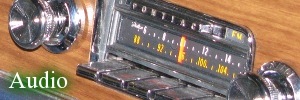















Hybrid Cars Gain Wider Consumer Acceptance |
|---|

|
John Birchard
Voice of America
Washington, D.C.
December 17, 2003
Audio Version 429KB RealPlayer
Hybrid cars, which are powered by both a gasoline engine and an electric motor, have grown beyond the novelty stage. Toyota's Prius for 2004 is a second-generation hybrid that is gaining wide acceptance.
The hybrid's reason for being is greater fuel economy and cleaner air. It does it by switching between a gasoline engine and an electric motor, with computers making the switch without the driver having to think about it.
Another advantage of the hybrid over an all-electric car: the hybrid charges its batteries while you drive. You never need to plug it in for a recharge.
The 2004 Toyota Prius is a vastly different and better car than the model it replaces. It's such an improvement, the staff of Motor Trend magazine has named it their Car of the Year. We asked Kevin Smith, the magazine's editor-in-chief, why Motor Trend chose the hybrid over 25 other vehicles?
"The Prius, it seems to us, represented performance in a larger sense," he said. "If you take a broader definition of performance, the hybrid power train in the Prius is just so well thought-out, so cleverly developed, so hugely capable that we really felt this represented the most significant development in the automotive scene for 2004 and we just could not turn it down."
Kevin Smith says the gasoline-electric hybrid has now made the transition from novelty to practical, "real world" transportation.
"With this new generation of Prius, we really think Toyota has brought the fuel efficiency and low emissions benefits of hybrid into the main stream," explained Kevin Smith. "Because this Prius is bigger, it's nicely styled, it performs well, it gets even better efficiency than the previous one. And you put all that together and it becomes a 'real car.' It becomes a car that anyone looking for reasonable, practical transportation could enjoy. And then, the great fuel efficiency almost becomes a fringe benefit."
The U.S. Environmental Protection Agency, charged with measuring fuel economy of all new vehicles sold in America, says the Prius produces 96 kilometers per U.S. gallon (3.78 liters) in the city, and nearly that on the highway.
The price of a Prius? Toyota maintained the base price, just under $20,000, even though the new car is a lot "more car" than its predecessor. Options can bring the total to the mid-20s.
Right now, Toyota and Honda have the hybrid market to themselves. But, says Toyota's national manager of advanced technology vehicles, Ed La Rocque, competition is coming.
"We've been told that you'll see as many as 20 new entries from the other major companies coming out in the next few years, and customers are embracing the hybrid technology," he said. Toyota is enjoying that embrace. The company recently announced a 31-percent increase in Prius production to meet U.S. customer demand. That translates to 47,000 units annually, more than double the previous year. In fact, says Ed La Rocque, folks were waiting in line when the new car came out.
"Prior to launch on October 17, we had approximately 12,000 retail and fleet orders already in our dealerships and from our fleet customers," continued Ed La Rocque. "This was without having the benefit of seeing or driving the car."
Toyota will not stop with the Prius. In the autumn of 2004, the company's luxury Lexus line will offer a hybrid version of its popular RX-330 sport utility. And in early 2005, Toyota's mid-size SUV Highlander will take the hybrid route.
